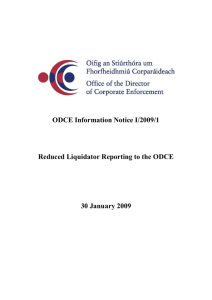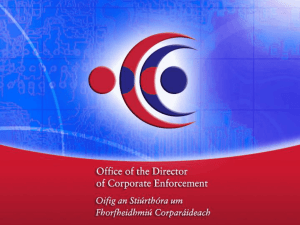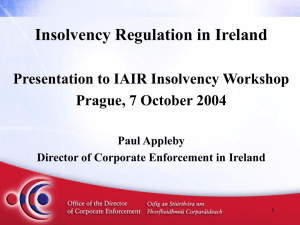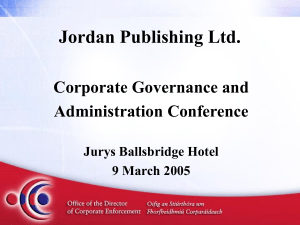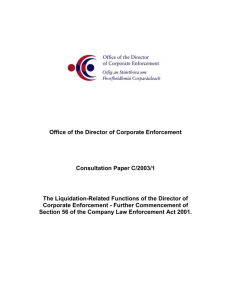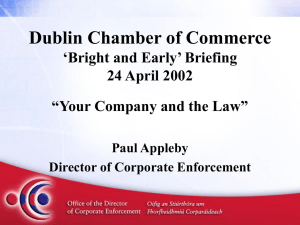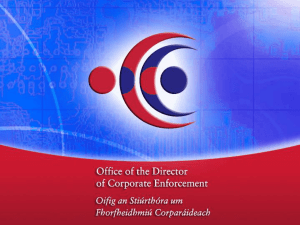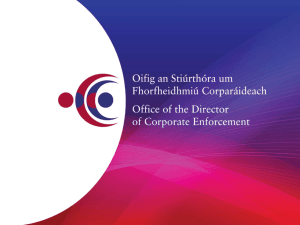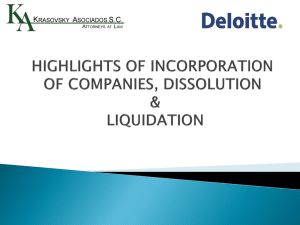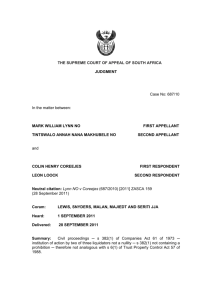Presentation - Office of the Director of Corporate Enforcement
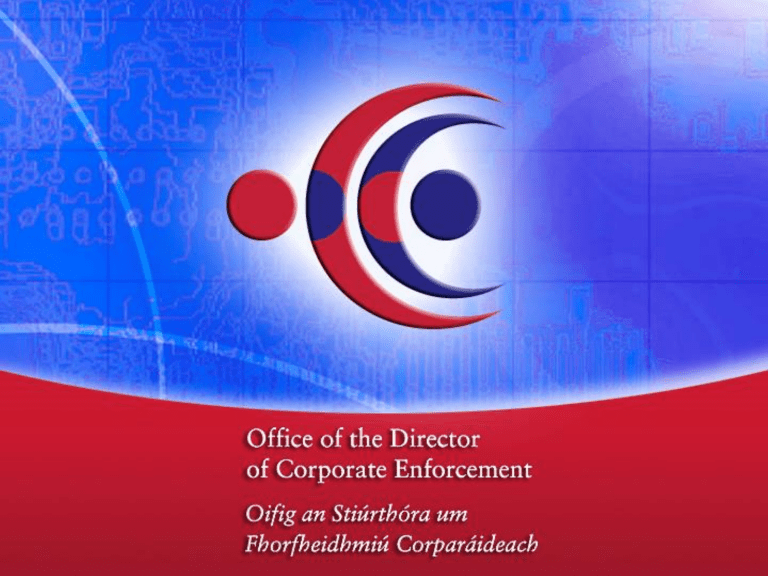
Insolvency review
An ODCE perspective
Kevin Prendergast
Corporate Compliance Manager, ODCE .
Presentation Overview
• Insolvency and the restriction process
• How ODCE interacts with liquidators
• Current ODCE experience
Insolvency and the restriction process
• ODCE receives reports on every liquidation
• Liquidator must take restriction proceedings
(Section 150 CA1990) unless relieved by
ODCE
• Liquidator can choose not to seek relief
• Liquidator can choose to pursue disqualification action
Insolvency and the restriction process
• Restriction typically lasts for five year period
• Name recorded on register at CRO
• Any company of which they are a director must be adequately capitalised
– Private company €63,487, plc €317,435
– Company limited by guarantee, must resign
Insolvency and the restriction process
• ODCE acts as filter to relieve Court of duty to examine all insolvencies
• Not relieving liquidator is not a finding of culpability
• Ultimately only the High Court can impose a restriction order
ODCE and Liquidators
• A joint process
– Liquidators must report within 6 months
• Liquidators may be given more time to reach conclusions
– Relief at this time
• Open communications
ODCE and Liquidators
• Vast majority of cases we are guided by liquidators
– since 2003, ODCE has accepted recommendations to grant relief in over 95% of cases
• in the small number of cases where we refused relief when sought, the High Court restricted in
60% of these cases
• since 2003, we have also granted relief in another
2% of cases where the liquidator did not seek relief
ODCE and Liquidators
• With regard to the conduct of directors in general
– we relieve liquidators in respect of 3 out of every 4 directors
– In 2008 91% of cases involved relief from restriction proceedings
– of the 1 in 4 who go to Court, 80% are restricted or disqualified
– in 2007, restricted in 96% of cases heard
ODCE and Liquidators
• Reasons for not granting relief
• Decision Notice D/2002/3
– 5.7 Criteria for Consideration of Reports
• Irresponsibility rather than Dishonesty
ODCE and Liquidators
– Evidence of trading while insolvent
– Level of debts/Revenue
– Payment of non-preferential creditors (e.g. directors)
– Failure to keep proper books being a contributory cause to insolvency
– Accumulation of issues
ODCE and Liquidators
• The successful role of the Office
– the 240 cases or so kept out of Court annually and
– the close alignment between ODCE and Court decision-making
ODCE and Liquidators
• Law since 2001 has regularised matters for all liquidations
• Some 650 persons now restricted
• Liquidators aware of their obligations
• Dishonest and irresponsible directors sanctioned
Current ODCE experience
• Reports received from liquidators
– Historic low of 273 in 2007
– Rose to over 400 in 2008
– By end of 2008 running at over 70 a month
– Looking at in excess of 700 for 2009
Current ODCE experience
• Of the notified liquidator appointments in
2008 (596)
– Almost 50% were in construction/property
– This is broadly in line with 2007 proportions
– Notified appointments up 85%
Current ODCE experience
• Unliquidated insolvent companies
– Struck off register for failing to file returns and owing debts
– Office monitors such strike-offs
– Directors of such companies can face disqualification unless they can prove no debts owing
Current ODCE experience
• Companies have three options
– Show evidence of no debts/debts paid off
– Re-register companies with CRO, obtaining audit reports where necessary and paying all fees and penalties (may involve High Court)
– Face disqualification proceedings
– 12 directors disqualified, one restricted in 2008
Further information
• Decision Notice D/2002/3
• Information Notice I/2009/1
– Removal of need for subsequent reports after primary decision
• www.odce.ie
THANK YOU
